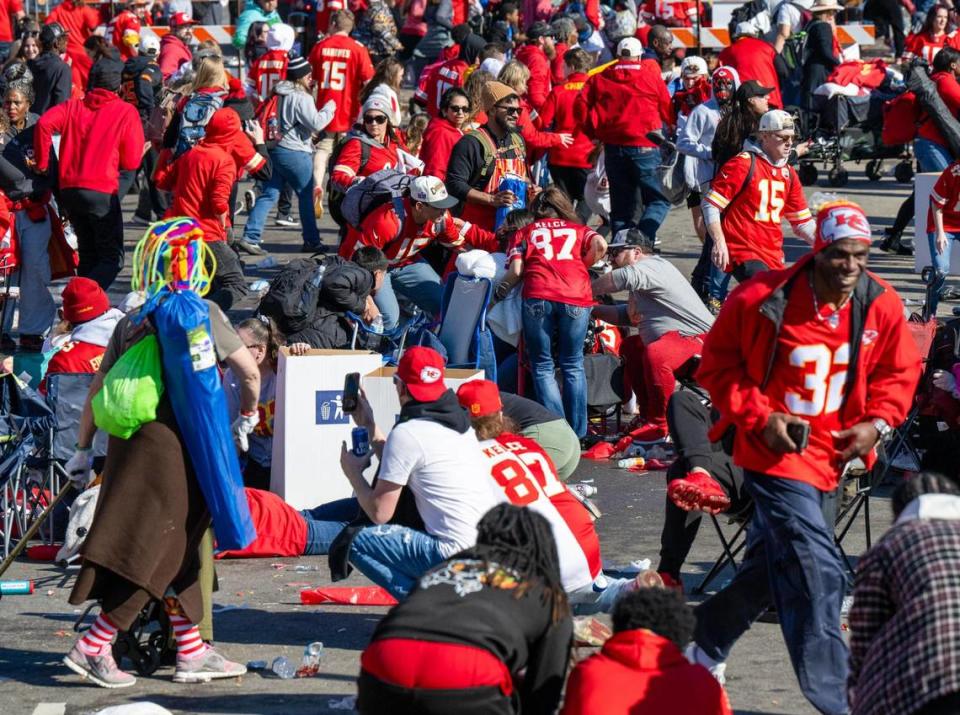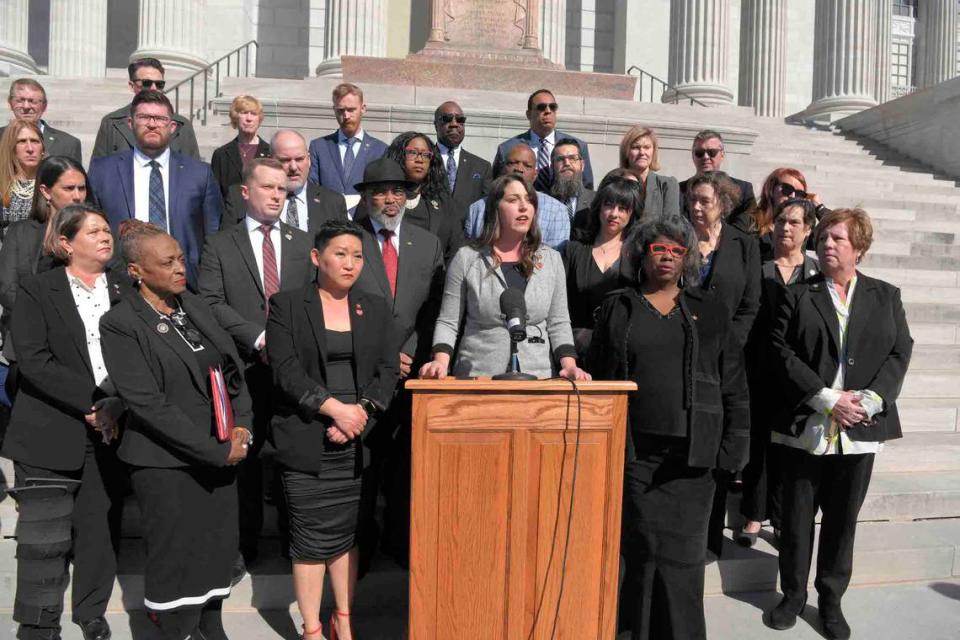Missouri and Kansas lawmakers leave loose gun laws unchanged after Chiefs rally shooting
Reality Check is a Star series holding those with power to account and shining a light on their decisions. Have a suggestion for a future story? Email our journalists at RealityCheck@kcstar.com.
When the shooting began at the Kansas City Chiefs rally on Feb. 14, Missouri state Rep. Emily Weber rushed into a restroom in Union Station, seeking cover amid the chaos.
Numerous lawmakers and politicians were at the rally that day when at least six people began shooting at each other, killing one bystander and injuring more than 20 others. Democrats and advocates for firearms restrictions called for action in the wake of the mass shooting – a moment witnessed by thousands of people that shocked the region.
Three and a half months later, the Missouri and Kansas legislatures, both controlled by GOP supermajorities, have ended their annual sessions without passing any significant limits on guns or additional safety requirements.
“I don’t think Republicans did anything at all to address gun violence or mental health,” Weber, a Kansas City Democrat, said.
Missouri and Kansas have among the most relaxed gun laws in the nation. Both legislatures have steadily chipped away at restrictions to create a permissive atmosphere that has contributed to the proliferation of firearms in both states.
Residents are allowed to carry concealed weapons without a permit, and in Missouri, a state law seeks to invalidate some federal gun restrictions. Both states have robust “stand your ground” provisions allowing for the use of guns in self-defense. Laws in both states also limit the power of local governments to enact their own firearms rules.
Many Republican lawmakers have adopted a maximalist position on Second Amendment rights, with some arguing that guns are needed to fight back against a possible future tyrannical government. Guns are cast as a necessary tool of self-defense, not only at home but also in public.
The aftermath of the Chiefs rally shooting demonstrates that not even a highly public mass shooting witnessed by a wide cross-section of residents and lawmakers of both states was enough to fundamentally alter the political dynamics of guns in Missouri and Kansas.
Missouri state Sen. Denny Hoskins, a Warrensburg Republican running for state secretary of state, said Missouri is “most certainly” doing enough to address gun violence. He described gun restrictions as only hampering individuals who follow the law.
“I’m obviously a big proponent of the Second Amendment. And I think we need to make sure that we protect our Second Amendment rights,” said Hoskins, who is facing a federal lawsuit for social media posts that falsely identified a man as the rally shooter.
“Again, you know, law-abiding citizens are always going to obey the law and criminals, no matter what new laws that you propose, are still going to break the law.”
The rally shooting posed perhaps the biggest test of support in recent years of both state’s permissive gun laws, especially in Missouri, where the shooting occurred. But in both states, firearms-related bills largely went nowhere, as Republican lawmakers tamped down on discussions of guns even as Democrats continued to speak about the shooting.
Democrats offered proposals, as they have in past years, that would have established so-called “red flag” systems to allow courts to in some instances to order someone to temporarily surrender their firearms during a mental health crisis. They also offered measures to require guns to be stored in locked containers and restore permitting requirements for concealed weapons.

One exception to this year’s general inaction on guns was “Blair’s Law,” a long-sought measure that would outlaw celebratory gunfire within city limits. The legislation is named after 11-year-old Blair Shanahan Lane, who was killed by celebratory gunfire in Kansas City after the Fourth of July in 2011.
The sweeping public safety package also increases penalties for people charged with unlawful possession of a firearm, raising it from a Class D felony to a Class C felony. It also increases penalties for injuring or killing law enforcement animals and adds penalties for people who encourage children to violate gun laws. Gov. Mike Parson has not yet signed or vetoed the bill.
Kansas House Speaker Dan Hawkins, a Wichita Republican, pointed to enhanced penalties for killing police dogs passed by Kansas lawmakers in response to a question about whether he was satisfied with the Legislature’s actions related to firearms this year – and if he was disappointed about anything that didn’t pass.
“Passing this bill was near and dear to my heart after I learned of the minimal penalties for killing a police animal after the violent death of K-9 Officer Bane in Sedgwick County. We also strengthened the penalties for fentanyl distribution and prohibited the possession of fentanyl in the presence of children,” Hawkins said in a statement.
“Equipping our law enforcement officers with the right tools to keep criminals off the streets was a top priority and I think we made some great strides this year that will help keep our communities safer.”
Bills to loosen rules didn’t pass
Even as Democrats were unsuccessful in advancing additional firearm regulations, Republican-backed legislation to further loosen restrictions on guns also didn’t advance – a possible concession to the political atmosphere following the shooting.
A February 2023 poll by Saint Louis University and YouGov found 79% support for requiring background checks on gun purchases and 69% support for requiring mental health background checks on gun purchasers and 60% approval for “red flag” laws.
The 2022 Kansas Speaks survey, conducted by Fort Hays State University, found more than 70% of respondents supported several gun-related policies, including red flag laws, limiting purchases to individuals 21 and older, and preventing gun sales to all individuals convicted of violent misdemeanors.
Kansas lawmakers held a hearing on, but didn’t pass, a state constitutional amendment that would have recognized the right to bear arms as a fundamental right, requiring any limits to clear a high legal bar. On the day after the rally shooting, the “gun rights preservation act” was introduced; a hearing was held but the bill died in committee.
“The one silver lining this year was that there wasn’t a big push by the gun lobby on their bills,” said Kansas state Sen. Cindy Holscher, an Overland Park Democrat.
In the Missouri House, Republicans scrapped two gun-related bills after the shooting. One would have allowed guns on public transit and inside churches and the other would have exempted firearms and ammunition from sales taxes.
Missouri House Majority Leader Jonathan Patterson, a Lee’s Summit Republican, said at the time that the bills had no path to becoming law this year and that it was “not the appropriate time” to bring them to the floor, even as he called them worthy of debate.
Patterson said in a statement last week that the answer to gun violence isn’t to limit the Second Amendment rights of “law-abiding citizens.”
“If we really want to see a decrease in violence the best thing to do is go after the criminals who are perpetrating the crimes and even using kids to commit crimes,” Patterson said.

‘Let them decide’
Some Kansas City officials say state law constrains their ability to fight crime by severely limiting the power of municipalities to set their own rules on firearms. Missouri lawmakers for decades have given themselves nearly exclusive power to set rules on firearms (Kansas has a similar law).
Missouri Democrats in the days after the shooting introduced a state constitutional amendment that would allow local governments to set their own rules. The amendment didn’t advance.
“Let the municipalities decide what their city, what their area wants to do about some common sense gun laws. Let them decide,” Weber said.

Kansas City’s ordinances address some gun regulations, including banning the transfer of firearms and ammunition to minors. The proposed constitutional amendment would have allowed the city to expand those laws as it grapples with record numbers of homicides in recent years.
Last year, 185 homicides were recorded in the city, according to data tracked by The Star, which includes fatal police shootings. Previously, 2020 was considered the city’s deadliest year ever, with 182 killings.
“I will also note that this isn’t just an issue in Kansas City, or St. Louis, or Springfield,” Kansas City Mayor Quinton Lucas said of gun violence at a news conference last week. “I saw a shooting the other day near the St. Charles, Missouri, Convention Center.”
“There are enough issues in this state that I think our gun violence does merit the attention of the Legislature,” Lucas said. “Each year it’s a priority of the Kansas City City Council. We’ll continue to make it one until we can all see change.”
The Star’s Nathan Pilling and Jenna Barackman contributed reporting


